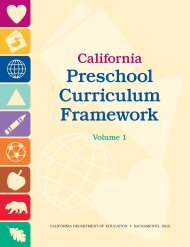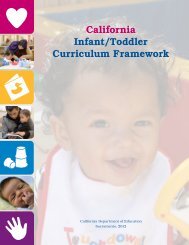California Preschool Learning Foundations - ECEZero2Three ...
California Preschool Learning Foundations - ECEZero2Three ...
California Preschool Learning Foundations - ECEZero2Three ...
You also want an ePaper? Increase the reach of your titles
YUMPU automatically turns print PDFs into web optimized ePapers that Google loves.
SOCIAL-EMOTIONAL DEVELOPMENT<br />
4<br />
Likewise, these foundations must<br />
be used carefully for children with<br />
special needs. Children who have<br />
physical or mental challenges, neurodevelopmental<br />
disorders, or other special<br />
needs proceed developmentally in<br />
ways that are similar to, but also different<br />
from, more typically developing<br />
children. Again, the research literature<br />
is limited regarding the documentation<br />
of age-related changes in social and<br />
emotional competencies. Furthermore,<br />
because the examples illustrating each<br />
of these competencies are written with<br />
typically developing children in mind,<br />
they may not be consistently relevant<br />
to children with special needs. Caregivers<br />
and teachers will be relied on for<br />
the insight needed to understand how<br />
these foundations can be applied to<br />
the children in their care.<br />
It is important, then, to acknowledge<br />
that the research literature providing<br />
a basis for these foundations draws<br />
on populations of children that vary<br />
widely in their diversity and, thus,<br />
must be considered carefully.<br />
Young children acquire social and<br />
emotional competencies in ways that<br />
are often different from how they<br />
acquire competence in the naming of<br />
letters or numbers. As illustrated in<br />
this section, social-emotional skills<br />
emerge through children’s experience<br />
in close relationships and the varied<br />
activities that occur in relational<br />
experience, such as shared conversation,<br />
warm nurturance, and guided<br />
assistance in learning capacities for<br />
sociability, responsibility, and selfcontrol.<br />
Social and emotional skills<br />
also develop through the shared activities<br />
of a developmentally appropriate,<br />
well-designed preschool environment.<br />
In such settings (and at home) and<br />
under the guidance of sensitive teachers,<br />
young children develop an understanding<br />
of other people’s feelings and<br />
needs, are encouraged to feel empathy<br />
and caring, learn to manage their own<br />
behavior as responsible group members,<br />
and acquire a variety of other<br />
capabilities that will be directly relevant<br />
to their success in managing the<br />
classroom environment of kindergarten<br />
or the primary grades.<br />
Last, but perhaps most important,<br />
play is a central context for social and<br />
emotional development in early childhood.<br />
Although these foundations<br />
focus specifically on developmental<br />
changes in only one kind of play (specifically,<br />
pretend play), it is apparent<br />
that many kinds of play contribute to<br />
social-emotional competence in preschoolers,<br />
including social play with<br />
caregivers and peers, play with toys<br />
and other objects, structured group<br />
activities, and even games with rules.<br />
One conclusion to be derived from this<br />
observation is that play is an essential<br />
cornerstone of healthy social and emotional<br />
development in early childhood<br />
and contributes to the skills necessary<br />
for adjustment to and success in<br />
school. This conclusion is reflected in<br />
the fact that one-third of the examples<br />
illustrating these competencies are<br />
based on children’s experience in play.<br />
Play is a central context for social<br />
and emotional development<br />
in early childhood.<br />
The preparation of these foundations<br />
enlisted many sources, including<br />
documents from the CDE detailing<br />
developmental expectations in relevant<br />
domains for older and younger children.<br />
<strong>Preschool</strong> <strong>Learning</strong> <strong>Foundations</strong>, Volume 1 • <strong>California</strong> Department of Education
















